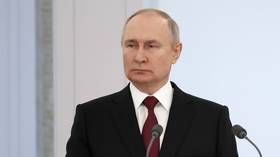Fyodor Lukyanov: One year ago, Russia gave the West a last chance to prevent a full-blown conflict – what went wrong?
Towards the end of 2021, the Kremlin made an attempt to push the West to negotiate on Russia’s long-standing political and defense grievances

It's been a year since a Russian document outlining proposals (or demands, if you prefer) for long-term guarantees on European security was delivered to NATO and the US. This was the starting point of the major politico-military crisis that defines the global situation today.
Was the Russian ultimatum (and that is how it was formulated) designed to be rejected, or did it envisage a path to negotiations?
President Vladimir Putin probably reasoned along the following lines: after so many years of ignoring our wishes and convictions, let's give it one last chance. Let's put forward the maximum set of demands, everything that has been said before, but outline them in one place and in a concentrated form, and see what happens. If they realize that this time that it’s extremely serious, and with that in mind, decide on a real discussion, we are ready. However, if they start to waste time again, then that's it. Let's cut to the chase.
If the response from the West was not satisfactory, the military operation in Ukraine would be the next step. There was apparently no chance of avoiding it by then. After all, the logic behind the need for the offensive was outlined in Putin's big article in the summer of 2021. That is, the security demands were made when the internal readiness for action was already in place.
The scale of the consequences leads many to return to the question: Was what happened inevitable? The argument that “we had no choice,” often heard at the highest level in Moscow, is problematic because it effectively means that Russia’s previous policies were wrong. A policy which leads to no alternative solution, i.e. forcing one to act in a certain way and no other way, cannot be considered successful.
So an analysis of the long period since the early 2000s will at some point be an important lesson for the future. Was there an urgent need to make demands and initiate the military operation at that point in time? Based on what we know now (which is probably not everything), there was room for maneuver and an opportunity to prepare better. Strategically, a conflict over Ukraine was probably inevitable, but the specific circumstances and timetable could have been different.
Is anyone in the West kicking themselves right now? An ultimatum can only be accepted by great powers, and even more so by superpowers, as a result of a military defeat. So there was, I think, no chance of the demands being accepted.
I have to say that the consultations that took place in January 2022 showed that the US was ready for some concessions on specific issues of military security. To a greater extent than they had indicated before the demands were made. However, this amounted to very little relative to the overall picture. Most importantly, NATO and the Americans categorically refused to discuss the main political issue: a formal rejection of NATO expansion.
For them, this is unacceptable because the military bloc’s enlargement is the basis of the entire international security philosophy as it has been understood in the West since the end of the Cold War.
But even beyond this, in the West there is a complete absence (or perhaps a disappearance) of reflection on the history behind current events. The view that Russia has no political, economic or moral right to demand anything has become an axiom and a basis for policy. And what has happened even seems to have brought some form of relief – there is no need to pretend any more.
After one year, how should we assess the outcome for our country, based literally on what was said in the document? The main outcome is that the politico-military situation has changed radically. Consequently, Russia's dissatisfaction with the previous state of affairs has been partially sated. As it was, it will no longer be.
NATO will not take further expansion lightly, realizing that the “nothing will happen in response” point of view no longer applies. Admittedly, this does not preclude a deliberate expansion for declared anti-Russian purposes, if there is enough determination, and that determination could well be inversely proportional to Russia's military achievements.
https://www.rt.com/russia/568451-fyodor-lukyanov-one-year-ago/


0 Comments:
Post a Comment
Subscribe to Post Comments [Atom]
<< Home